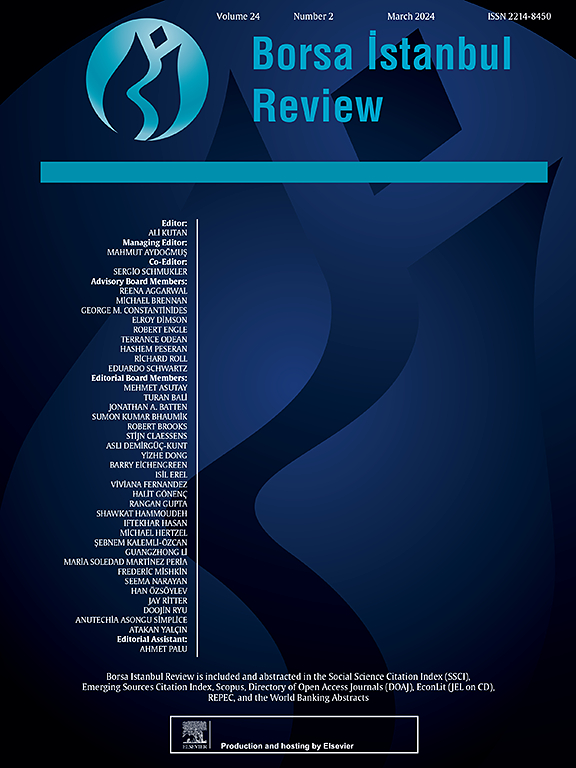为衡量撒哈拉以南非洲的数字金融包容性做出贡献
IF 7.1
2区 经济学
Q1 BUSINESS, FINANCE
引用次数: 0
摘要
尽管撒哈拉以南非洲地区在发展数字金融服务方面取得了显著进展,但目前还没有一个全面的衡量标准来量化这一进展。因此,我们采用参数法构建了数字金融包容性指数。我们的研究结果表明,从 2014 年到 2021 年,数字金融包容性呈上升趋势,2021 年这一指数明显上升。根据工具变量法,我们发现 COVID-19、人均增长产品和治理质量是数字金融包容性的主要驱动因素。此外,研究结果显示,并非所有撒哈拉以南非洲国家都同样受益于数字金融革命。包括肯尼亚、加纳和科特迪瓦在内的一些国家因其高度的数字金融包容性而受益匪浅。然而,其他国家,如马拉维、几内亚、布基纳法索和马里,在数字金融包容性方面却落在后面,从数字银行革命中获得的好处较少。我们将这一现象视为不平等的表现。利用沙普利分解分析法,我们发现受考察国家在数字金融包容性方面存在的差异,33%归因于数字金融服务使用方面的差异,13%归因于获得这些服务方面的差异。我们发现,法律渊源是获取和使用数字金融服务不平等的驱动因素。此外,互联网接入也是造成数字金融服务使用不平等的原因之一。就经济影响而言,数字金融包容性最低的国家必须修改其法律制度,并投资于互联网基础设施。本文章由计算机程序翻译,如有差异,请以英文原文为准。
Contribution to the measurement of digital financial inclusion in Sub-Saharan Africa
Despite the notable progress made in the development of digital financial services in sub-Saharan Africa, no comprehensive measure is currently available to quantify this progress. Therefore, we constructed a digital financial inclusion index using a parametric approach. Our findings show an upward trend in digital financial inclusion from 2014 to 2021, with a notable increase observed in this index in 2021. Based on the instrumental variable approach, we found that COVID-19, growth product per capita, and quality of governance were the main drivers of digital financial inclusion. Furthermore, findings reveal that not all sub-Saharan African countries have benefited equally from the digital financial revolution. Some countries, including Kenya, Ghana, and Côte d’Ivoire, have benefited substantially because of their high degree of digital financial inclusion. However, other countries—such as Malawi, Guinea, Burkina Faso, and Mali—have fallen behind in terms of digital financial inclusion and are reaping fewer benefits from the revolution in digital banking. We interpreted this observation as symptomatic of inequality. Using the Shapley decomposition analysis, we found that 33% of the disparities in digital financial inclusion among the examined countries were attributable to differences in the use of digital financial services and 13% to the differences in access to those services. We identified the legal origin as a driver of inequality in both access to and use of digital financial services. Moreover, access to the internet has contributed to inequality in the use of digital financial services. In terms of economic implications, countries with the lowest digital financial inclusion must revise their legal systems and invest in internet infrastructure.
求助全文
通过发布文献求助,成功后即可免费获取论文全文。
去求助
来源期刊

Borsa Istanbul Review
Multiple-
CiteScore
7.60
自引率
3.80%
发文量
130
审稿时长
26 days
期刊介绍:
Peer Review under the responsibility of Borsa İstanbul Anonim Sirketi. Borsa İstanbul Review provides a scholarly platform for empirical financial studies including but not limited to financial markets and institutions, financial economics, investor behavior, financial centers and market structures, corporate finance, recent economic and financial trends. Micro and macro data applications and comparative studies are welcome. Country coverage includes advanced, emerging and developing economies. In particular, we would like to publish empirical papers with significant policy implications and encourage submissions in the following areas: Research Topics: • Investments and Portfolio Management • Behavioral Finance • Financial Markets and Institutions • Market Microstructure • Islamic Finance • Financial Risk Management • Valuation • Capital Markets Governance • Financial Regulations
 求助内容:
求助内容: 应助结果提醒方式:
应助结果提醒方式:


